Key takeaways from pro-manchester’s Economics Conference
Monday, 22nd October 2018By Mel Hill
pro-manchester’s sold-out Economics of Greater Manchester Conference at The Lowry Hotel welcomed experts from our region to discuss the key issues affecting our region’s economy.
High on the agenda was homelessness, the skills gap, pollution and, of course, Brexit.
So, what’s next for Manchester?
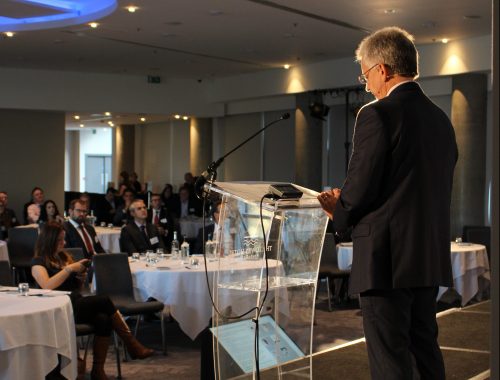
Mike Blackburn, chair of the Greater Manchester Local Enterprise Partnership believes: “we shouldn’t be waiting for central government to make plans for the north, we should be setting our own agenda.”
Mike continued: “Voices from the business, voluntary communities and the public sector is vital. We can either be done unto, or we can do.
“Our great city region has been built on social and industrial pioneers for centuries. Our plan with the Industrial Strategy is to continue this in order to expand prosperity throughout our region.”
What does our region look like post-Brexit?
In short, even the experts aren’t sure. A panel discussion, consisting of Gary Davison, TDC; Chris Peacock, Grayling Manchester and Helen Wong MBE, Clarke Willmott made for a great debate.
“It’s a very complicated situation and we’re not really much further on from what we saw a few weeks ago,” says Helen Wong MBE, author of Business Before Brexit and partner at Clarke Willmott.
She continued: “There are people trying to move things on, but Theresa May hasn’t geed up Parliament. We have got this huge uncertainty which is adversely affecting British business in particular.
“There will be a Brexit. I highly doubt there will be a second referendum, no matter how much noise the people make. We’re just not sure what type of Brexit we will have.”
“That’s the issue,” says Chris Peacock, head of Grayling Manchester. “Where are we going to end up with Brexit? The people aren’t being listened to and in all honesty, they’re no longer bothered about Brexit as such, but more about what is going to affect them.
“The media would have you believe different, but the public appetite for wanting to discuss this anymore is minimal. They don’t care for the economic outcomes, they care for how it affects them on a day-to-day basis. There is no capacity in government other than Brexit at the moment. The rest of the country is being ignored but there is no time to do it because Brexit is being so heavily focused on.”
What are the issues the people of Greater Manchester want to see improvements to?
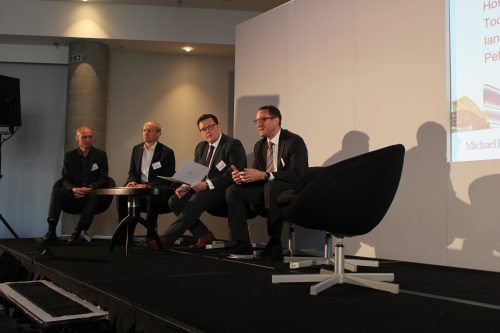
Greater Manchester’s air quality is getting more and more detrimental to our health as time goes on.
This is something high on the agenda of panellists Todd Holden, GC Business Growth Hub; Ian Palmer, TfGM and Pete Stringer, City of Trees Trust.
Todd Holden, director for low carbon at GC Business Growth Hub leads on the group’s social value offer, aiming to ensure that economic growth benefits, rather than hinders the places where it is generated.
“How bad is our pollution problem? I think short answer is really bad, it impacts all of us every single day,” says Todd.
“The use of personal vehicles is the biggest thing that’s transformed in the last 100 years. Those personal choices we’re making are having wider impacts on climate change and pollution than we initially may have thought.
“We have now got to the point in our region where we have areas that aren’t safe to breathe in. In parts, primary schools aren’t able to open their windows because of pollution. This is a particular problem when we have weather like we had this summer.
“Both South Manchester and North Manchester have the highest asthma emergencies in the country. We need to ensure everybody has the choice of a pollution-free zone.
“If we don’t do something now, spend will shift from preventing pollution to investing into how we can survive it.”
Pete Stringer is GI planning and technical manager at City of Trees, an innovative and exciting movement planting a tree for every man, woman and child who lives in Greater Manchester.
Pete is passionate about planting trees to create a barrier of oxygen to try and combat our region’s polluted air: “We have important pinch points where it is an absolute priority to plant more trees to create that barrier between the source of pollution and cleaner air.
“Developers need to understand the importance of ensuring there’s enough space for the number of trees we need in the city area. While it’s great to see Manchester growing, we need to see balance. With growth comes more people and more pollution, this is why planning the planting of these trees is so vital at development stage.”
Can developers do more for the region as they expand our skyline?
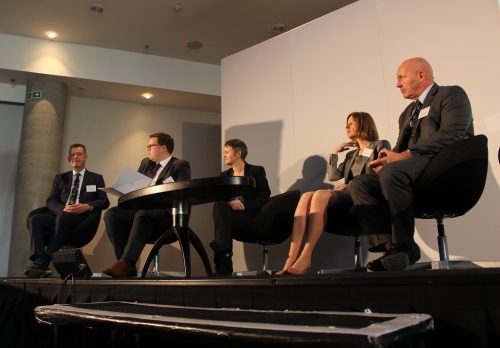
Jim Taylor, chief executive of Salford City Council and interim chief executive of Trafford Council says: “We need shiny new buildings and high-end housing to benefit our economy, but it’s just as important to have affordable social housing to benefit it too.
“The more people we have in housing, with stable lives and jobs paying rent into a system, the better it is for not just the economy, but for the lives of the people in our cities.
“It’s only small at the moment, but we currently have plans for new social houses. We’re not creating more council estates, we’re creating places where people can live.”
John Russell, group executive chairman at Fairhome Group ‘slept rough’ earlier this month to raise money for the Booth Centre. ‘The CEO Sleepout’ gives individuals a small glance into life on our streets. “We did one night. At the end of the day it was nowhere near what these people who are living rough are going through. There were no dangers. The issue is much wider than just putting your head down on the streets at night,” said John.
“For me, ‘homeless’ is a very generic word. I feel a bit embarrassed about going home each night and having a nice sleep. This is a key part of society we need to address.
“The cost is hundreds of millions and the infuriating thing is that money is out there in the private sector, but there’s no one to facilitate these homes for vulnerable people, so it isn’t worth the while of multi-million-pound development companies.”
While these private companies may have good intentions, are there enough houses being built to accommodate our region’s ever-growing population?
“Undoubtedly the numbers that are being cited at the moment in terms of what’s expected are not great. We need to hit those numbers and ensure we’re building these houses in the right places and the right environment.
“There are a lot of people from different sectors who are keen to achieve the target of enough houses, but land supply is an issue as is getting the right money in the right place. There’s a much bigger focus than there’s been previously,” says Suzanne Benson, regional managing partner at Trowers & Hamlins.
Amanda Croome, founder and CEO of the Booth Centre believes it is everyone’s responsibility: “Everybody should have a decent home, not just a bed for a night. There are people living in very desperate conditions. Without the help local businesses and local people have the ability to give, this will continue.
“Every business needs to work with local charities and local authorities, otherwise Manchester isn’t going to be the place we want to be or live.”
Manchester’s aim is to be a top 20 global city by 2035. As well as homelessness, there are a number of things required to achieve this.
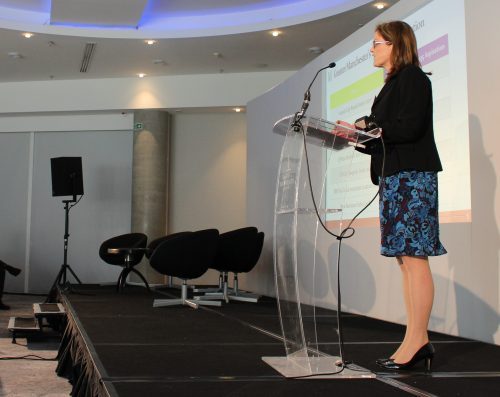
Sheona Southern, managing director, Marketing Manchester says: “Manchester is only at number 31 for the best cities with things to see and do. This is mainly down to the fact that we don’t have that tourist product that draws visitors to fly in.
“While we have two of the world’s largest football clubs, we are also developing a series of attractions and tours, including buses to the Lake District, Yorkshire, Cheshire Oaks and the zoo. The important part of this is that these tourists stay the night in Manchester, which is great for our hotels.
“Tourism is worth £8.1bn to our economy, creating 94,000 jobs city-wide, we’re aiming to increase economic spend to £8.8bn by 2020. To achieve this, we only need to grow by 9% each year.”
Spending from occupants of our city is just as important as that of tourists.
With the recent announcement that the iconic Kendals building is the latest victim of the high street, what’s next for retail?
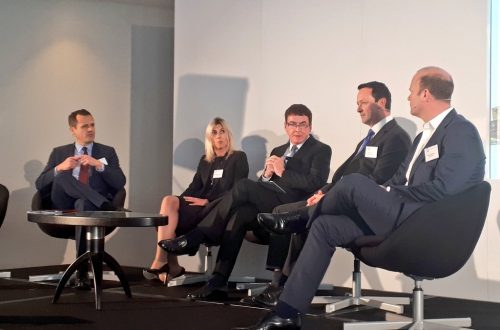
A changing face of retail panel, consisting of David Allinson, Manchester Arndale; Dan Butler, Trowers & Hamlins; Lindsey Cooper, RSM and Paul Titterton, Yorkshire Bank discussed what was next for Greater Manchester’s high streets.
David Allinson, centre director for Manchester Arndale says: “Footfall at the Arndale is positive. Food and beverage is what is helping us to thrive. This may not continue but it’s likely you’ll see more innovation from leisure and entertainment to ensure they become centres in their own right, not just retail centres.”
Is this the same for banking? Paul Titterton, head of network for Yorkshire Bank has noticed a huge shift in how the bank sells to its millennial customers: “Millennial shoppers are seeking an emotional connection with their brands. They want an experience, not just a banking service. This is what has led banks to opening lounges in major cities for their customers to use.
“There’s far more things to do to make your brand more immersive and we’ve got some really exciting ideas coming to fruition at Yorkshire Bank at the minute.”
With brands like these adjusting more and more to our new digital world and the millennial shopper, we are now starting to see huge skills gaps in technology.
Patricia Keating is executive director at Tech Manchester, a community for Manchester’s digital and tech industries, nurturing Manchester’s start-ups, connecting investors and boosting Manchester’s digital dominance.
Speaking on a panel alongside Deirdre Hughes, GC Business Growth Hub; Sally Lister, POPHOMES and Helen Marshall, University of Salford, Patricia said: “In tech at the minute, 13 jobs are opening for each person qualified. 30% of the jobs in tech in Manchester are unfulfilled and this is because we don’t have enough people coming through the pipelines to fill these roles.
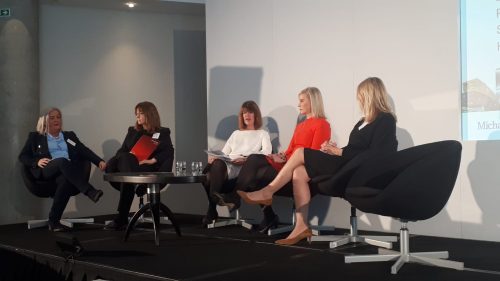
“Only 17% of people working in tech are women and only 15% are from BME backgrounds, so we’re fishing in an unnecessarily smaller pond than we need to.
“Girls fare much better in computing at GCSE and A Level, but they lose interest in tech because they’re told directly or indirectly that tech roles aren’t for them. We need to engage both girls and those from BME backgrounds at a younger age and tell them that tech isn’t just a playground for boys.”
Helen Marshall, vice chancellor at the University of Salford believes it isn’t just the educational institutions that need to help with these skills gaps: “The whole workplace environment is working at a pace that is difficult to keep up with.
At Salford we’re looking at what we need in the next 2-3 years, but we want to be looking ahead. The issue we have with this is, it is believed that 65% of children in primary school now will do jobs that currently don’t exist, so how do we prepare for and predict what courses to offer?
“If we’re going to move to a demand-led curriculum then industries need to get a lot closer to education, it’s a two-way street. We need to know what it looks like in their sector 10 years in advance and there are sector experts out there who already have this information but aren’t sharing it.”
Although our region has a large skills gap, it isn’t all doom and gloom, with Manchester’s employment rate at an all-time high.
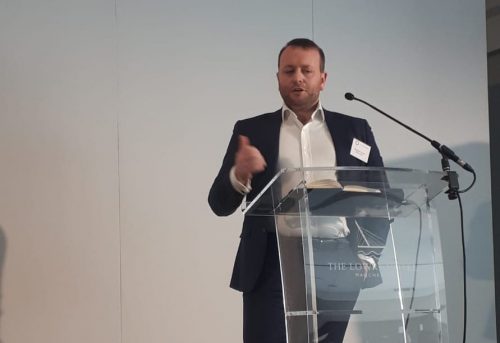
Graham Lucas, managing director at Michael Page shared some fascinating stats from a recent study done by Page Group. “2017 was the strongest year on record for northern tech investment. £432m was raised, and Tech Nation ranked Manchester as the fifth biggest technology hub in Europe.
“While 20.2% of our current workforce are working in occupations likely to shrink, 30-35% of what will be required of you in your job role in years to come is not currently something you do. While there will be reductions in other aspects of your role due to autonomy, there will be more to do in other areas when new technologies arise.”
A thought-provoking day for all attendees, with a great array of speakers made for a huge amount of positivity for Greater Manchester professionals to take away with them from our conference.
pro-manchester’s Economics Conference was kindly sponsored by Michael Page, Trowers & Hamlins, GC Business Growth Hub, Yorkshire Bank, Latitude Studios and Vision Events.
Photos by Will Levison